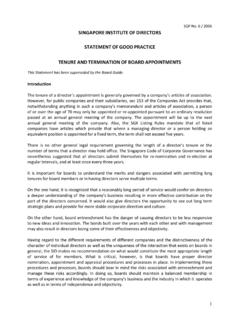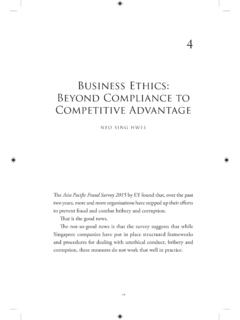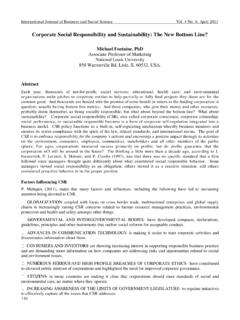Transcription of towards a new normal for businesses - sid.org.sg
1 20546towards a new normal for businesses robert CHewEven as companies and their boards wrestle with how to deliver greater economic value to their investors, they need to be aware of the greater forces at play which are changing the very landscape in which they of these changes such as technological advances, customer demographics and demands, and industry-specific trends are likely to be already on the radar of most companies. What may not be considered, however, is the turbulence that could arise from climate change, resource crunches and population growth.
2 As New Scientist puts it, Extreme is the new normal .206boardroom matterStHe breaKtHrouGH deCadeA recent study by think tank and consultancy Volans, Breakthrough: Business Leaders, Market Revolutions describes the giant waves caused by societal pressures that have progressively impacted governments, businesses and financial markets. The current wave focuses on the emerging concept of sustainability: meeting the needs of the present without compromising the ability of future generations to meet their own believes that the next wave could occur between 2015 and 2025.
3 This so called Breakthrough Decade will coincide with the development of the United Nation s Sustainable Development Goals which is expected to go wider, deeper and longer than the previous set of UN Millennium Development report concludes that businesses have an increasingly vital role to play in creating a world fit for the nine billion people predicted for 2050, and calls for market revolutions in areas such as accounting, valuation and awaYIn the context of this changing landscape of increasing governance and environmental and social challenges, how should boards and their companies respond?
4 Here are three ways to break away from current operating , companies should consider how they report to their stakeholders, not just their shareholders. Richard Branson declares that the brands that will thrive in the coming years are the ones that have a purpose beyond profit . Smart companies today understand that they have responsibilities not just to investors, but also to customers, employees, suppliers, the environment and 207towardS a new normal For buSineSSeSthe community at report to all stakeholders, companies should, at the minimum, adopt sustainability reporting, such as the Global Reporting Initiative s Sustainability Reporting Guidelines.
5 The guidelines have three reporting dimensions: economic, environmental and social. These cover areas such as organisational governance, human rights, labour practices, environmental practices, fair operating processes, consumer issues and community involvement and latest concept in stakeholder reporting is integrated reporting. Like sustainability reporting, integrated reporting promotes the disclosure of non-financial information that matters to the company s long-term prospects. However, the emphasis is on the integration of this information and how it can provide a coherent view of how the company creates , companies should consider how their business strategies and operations should change in order to address the gaps and issues identified by their sustainability or integrated reports.
6 These changes may range from incremental ones to those that could potentially disrupt the business or an entire such change could simply be implementing the 3Rs of Reduce, Reuse and Recycle. Companies that do so have found a verifiable impact not just on the environment, but also in a reduction in operating costs. For example, StarHub s initiatives to reduce paper by encouraging electronic statements and minimising printing at retail shops save it 45 tonnes of paper a greater change can come from the use of renewable or clean energy (wind, water or solar).
7 Data centres which consume large tracts of energy are prime candidates for this. Increasingly, giants such as Apple, Facebook and Google use renewable electricity to power their data area is for companies to look specifically at how they can 208boardroom matterScreate a social impact in a way which is aligned with their businesses . DBS Bank, for example, promotes and supports social enterprises in an integrated way. It has a multi-faceted relationship with social enterprises: as customers (it provides them special banking packages), suppliers (it buys from them), and beneficiaries (of its corporate social responsibility programmes).
8 Some companies have a corporate venture capital fund which invests in companies with the goal of driving financial and strategic returns. A few companies have extended this further into what is known as corporate impact venturing where the metrics of strategic returns include social and environmental , companies should seek to keep abreast of the latest developments and ideas for this new normal . They should join associations such as Singapore Compact and the Business Council for Sustainable Development Singapore to learn and network with peer companies on sustainability.
9 In addition, directors and executives interested in this space should attend relevant forums such as 2014 SID Directors Conference with its theme of towards The New Capitalism .The new normal of thinking beyond mere profits is an emerging but important phenomenon. Boards and management need to adopt broader long-term goals; otherwise, they risk their companies becoming laggards of their industry.






